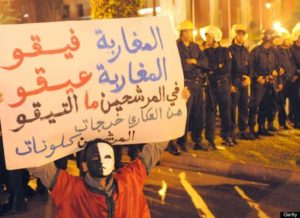by FPA Administrator
Guest Post: Leila Hanafi
 A protestor’s sign reads ‘Moroccans be vigilant, do not trust parliamentarians.’ (Getty)
A protestor’s sign reads ‘Moroccans be vigilant, do not trust parliamentarians.’ (Getty)
As the Arab Spring turns to fall across the Middle East and North Africa, the region is unquestionably in the midst of transformational change. The cascade of events over the past few months have varied from country to country, but in each case there has been a focus on the emerging role that youth will play economically and politically.
Like much of the rest of the Middle East and North Africa, Morocco was swept earlier in the year with popular youth-initiated protests calling for reform. The king responded with the promise of true constitutional reform, which was well underway before the protests began. By late summer, the weekly demonstrations gradually subsided. But there should be no mistake. There has been a fundamental transformation of how Moroccans, particularly young Moroccans view themselves and their relationship with their governments.
On November 25th Moroccans will go to the polls to select a new government. The new parliamentary body is charged with enacting new policy to create more political and economic opportunities for the youth of the country. However, legislation passed by the Moroccan Council of Ministers on September 9th designed to guarantee more parliament seats to younger generations and women has caused a surge of new protests from the same demographic they are meant to serve.
In my capacity as a Moroccan human rights lawyer, I recently talked to several youth groups in the capital city of Rabat. I wanted to hear first-hand their complaints, impressions and aspirations as the elections draw near. While the youth of Morocco truly want reform and to be more engaged in the future direction of their country, there was a clear consensus that an electoral quota – thirty seats reserved for young people under forty – was perceived as a violation of the spirit of equality endorsed by the new constitution. A minority quota for those under forty implies a majority quota for those older than forty.
The way to advance youth participation was not to implement quota systems, but for political parties to provide young emerging political leaders with opportunities for progression within their parties. “If there is a real will to inject new blood in this new era of political transition, then youth representation in the Parliament should not be confined by a quota list,” said Hakima Alem, a young graduate student in Rabat.
By late September, thousands of Moroccans had demonstrated once again in the country’s largest cities Casablanca and Rabat. Threatening to boycott the upcoming elections, the demonstrations attracted around 10,000 people in Casablanca, making it the largest demonstration in months. In Rabat, a peaceful protest of about 2,000 people marched from the lower income neighborhood of Akkari to the parliament headquarters.
In trying to understand youth frustrations with the upcoming elections, I talked to Moroccan political analyst Mohamed Hajaj who observes that, “The lack of confidence in understanding political processes is a major roadblock to youth political participation and especially in rural Morocco where the young are marginalized from societal life.”
To see what can emerge, we should consider Morocco’s rapidly changing social structure. Similar to other countries in the region, Morocco boasts a youthful population, with over 50% of the population under the age of 30. More educated and more aware of their global context than prior generations, these young people are facing a crossroad of major change for their country.
During my conversations with young Moroccans, it is clear they would like to see more programs in the country designed to encourage youth engagement in politics and to provide them with information on the electoral process. For political liberalization to prevail, the country’s predominantly young population needs to fully understand their rights as well as their responsibilities. The present dearth of positive outlets for civic participation in Morocco leaves many young people feeling cynical about participating in what they perceive to be a closed social and political system. Widening social disparities and limited job opportunities compounds these feelings. For young people in this context, the principles of fair elections may seem a distant theoretical concept, rather than a powerful framework for government accountability. Without opportunities for productive active engagement in Morocco, young people’s frustrations may easily boil over into violent behavior, leading to significant economic and social instability.
The youth activists in Morocco are not standing still. A grassroots campaign is currently underway, organized by the Movement of Young Moroccans for Political Representation Now, and has mobilized hundreds of political activists representing youth groups and civil society organizations. The campaign will stop in 80 towns and villages to encourage other young Moroccans to get involved in the political process and importantly to vote in the upcoming elections.
As my generation experiences the opportunity for an unprecedented wave of political transformation and power in Morocco, it is my hope that they will be perceived as equal stakeholders in bringing about the country’s renewal, reform and positive change.
Martin Luther King, Jr., in his compelling Letter from Birmingham Jail proclaimed that, “a right delayed is a right denied” (16 April 1963). The call today for the rights of dignity, justice and a better life are legitimate aspirations for Moroccan youth and the way forward for all of Morocco.






